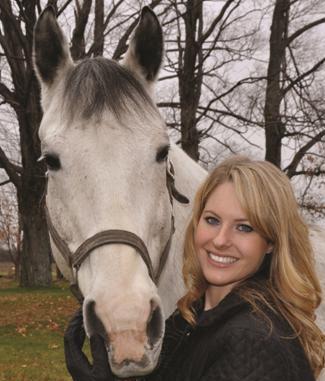Rx for a lonely horse

ONE QUESTION I am commonly asked by my clients is what I think about non-horse companion animals. This usually comes up in situations where there is limited space for more horses, or an owner has one horse and doesn’t want it to be lonely, but can’t afford to support another one. This always makes me think of a very special client.
Brenda had two horses, Rosey and Quatro. Rosey was the mother, and Brenda had owned both horses their entire lives. Unfortunately, Quatro got very sick and died, leaving Rosey by herself. This was a devastating loss for Brenda and Rosey, who was so upset by the loss of her son that she colicked every day for a week!
Not wanting to bring another horse into her life, Brenda came upon a wild burro in need of re-homing. She was very excited about her new addition, though he had very little handling, no vet work done, was still intact, and texted me “this is not a sexy donkey” upon his arrival.
Brenda always insists on the gold standard of care for her horses, and this donkey was no exception. She had me out immediately to get him vaccinated, his teeth floated, castrated, and to trim his grossly overgrown feet. Now, granted, I’m not always a huge fan of working on donkeys, especially semi-feral ones. But this donkey had fallen head over heels in love with Brenda, and so had she for him. The bond between the two was so touching to see, I couldn’t help falling for him as well. Today he is living a dream life, and Brenda couldn’t be happier with her decision to adopt him.
Donkeys and mules/hinneys can make excellent additions to a horse barn as companion animals. They are much more feed-efficient than horses and require little hay to maintain adequate body condition. They make good guard animals against predators, are less prone to diseases such as colic, and can provide a wealth of entertainment. However, they do require the same routine vet care, such as vaccinations and dental care, and need to be seen regularly by a farrier.
The most common disease I treat in donkeys is laminitis, or founder, as a complication of insulin resistance, which can occur when they are allowed to become overweight. Donkeys are fun to own and can be used as pack animals for trail rides, driving carts, and even riding.
If you find yourself looking for an addition to your backyard, consider adopting a donkey ... if you don’t mind some funny noises!
Dr. Lora Howell of Meddleton Equine Clinic is a graduate of Cornell University and trained at Manor Equine Hospital in Maryland and the American School of Equine Dentistry. Reach her at drhowell@meddletonequine.com.
